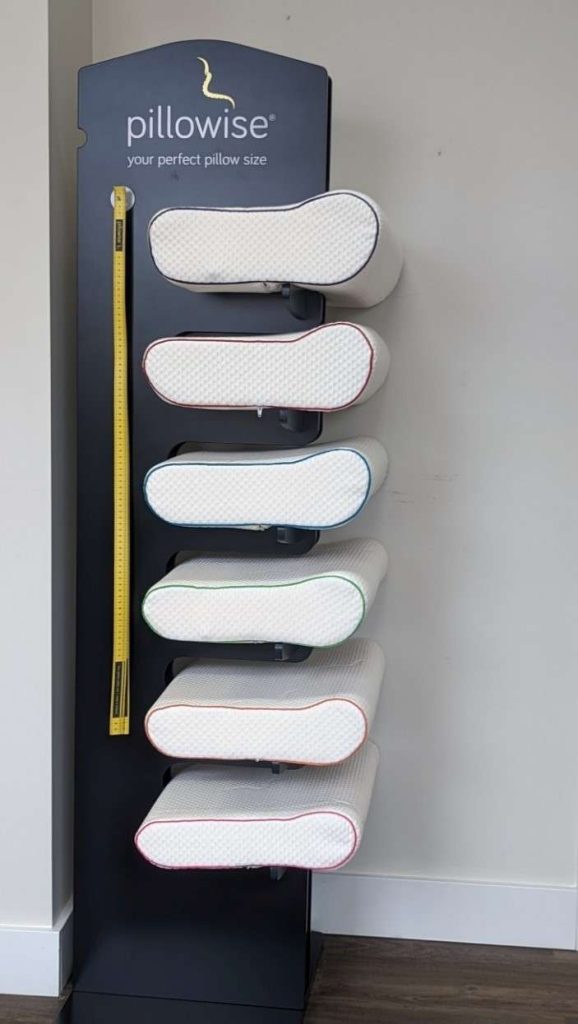Getting a good night’s sleep is crucial for our physical and mental health. Sleep is an important part of healing and recovery, memory retention, our immune system and many other functions. As a physiotherapist, I often see patients who are struggling with sleep problems, which can have a significant impact on their overall wellbeing. This can include increased moodiness/irritability, increased perceptions of pain, weight gain, and increased stress levels. In this blog, I will share some tips and techniques that can help you get a better night’s sleep.
Establish A Regular Sleep Routine
Going to bed and waking up at the same time each day can help regulate your body’s natural sleep-wake cycle. This means that your body will start to feel tired at the same time each night, making it easier to fall asleep. Your routine should be a routine. Meaning, you should try to do the same 3-4 tasks around the same time and in the same order each night. This will send a signal to your brain that it is time to wind down and will help you have a better-quality sleep. For example, a routine could be 1) take a warm bath, 2) slip into pajamas, 3) drink chamomile tea, 4) read a book for 15 minutes or listen to calming music.
Create A Sleep-Conducive Environment
Your bedroom should be a comfortable and relaxing space. Keep the temperature cool, make sure your bed is comfortable, and try to eliminate any distractions such as noise and light. Quite helps reduce stress and anxiety. If you can’t eliminate noise, consider using earplugs or a white noise machine.
Keeping your room dark is important because light can still penetrate your thin eyelids and keep your brain ‘awake’ while you are sleeping, leading to fatigue and grogginess in the morning. Darkness also helps produce melatonin, a hormone that helps you sleep. Black-out blinds are great, especially if your bedroom faces a street or has lampposts outside your home.
You can also use an essential oil diffuser with scents that are calming and known to promote good sleep, such as lavender, chamomile bergamot, or cedarwood.
Check out this resource on how to create a bedroom designed for a better sleep.
Avoid Stimulants Before Bedtime
Avoid working out, consuming caffeine or nicotine at least 2 hours before bedtime, as they can interfere with your ability to fall asleep. Additionally, try to limit alcohol consumption as it can disrupt the quality of your sleep and can make you feel groggy in the morning.
Wind Down Before Bed
Engage in relaxing activities before bedtime, such as reading a book or taking a warm bath. Avoid engaging in stimulating activities, such as watching TV or using electronic devices, as the blue light emitted by these devices can interfere with sleep. Many devices now have a “Night Light” setting that dims the screen and tinges the hue to be more yellow, which is easier on the eyes. There are also blue light blocking glasses on the market now which block out the harmful blue light from screens.
Exercise Regularly
Regular exercise can improve the quality of your sleep. However, avoid exercising too close to bedtime as it can make it harder to fall asleep.
Manage Stress
Stress and anxiety can make it difficult to fall asleep. Consider incorporating stress-reducing techniques into your daily routine, such as meditation or deep breathing exercises.
Have The Right Pillow
In addition to the tips I’ve already mentioned, using a custom pillow can also help improve the quality of your sleep. A custom pillow is designed to support your neck and spine, which can reduce pain and discomfort while you sleep.
Many people experience neck pain, headaches, and shoulder pain due to poor sleeping posture, which can be alleviated by using a custom pillow. These pillows can be customized based on your individual needs, such as your preferred sleeping position, body shape, mattress firmness, and the level of support you require.
For example, if you sleep on your back, a pillow that is too thick can push your head forward, causing neck strain. A custom pillow that is designed to support the natural curvature of your neck can help prevent this. If you sleep on your side, a pillow that is too thin can cause your head to tilt downwards, putting strain on your neck. A custom pillow that is thicker on one side can provide the necessary support.

Overall, a custom pillow can help you maintain good sleeping posture, reduce pain and discomfort, and improve the quality of your sleep. If you’re experiencing sleep-related issues, it’s worth considering investing in a custom pillow to see if it can make a difference. Your physiotherapist can recommend a custom pillow that is tailored to your individual needs.
If you have tried different pillows and still can’t get a good night’s sleep, give us a call at 289-472-5571 or book a complimentary custom pillow assessment here. All pillows are made of natural fibers with stay-cool technology, a risk-free 30-night sleep trial and an unparalleled 5 year warranty.
Looking for More Tips?
Previously, I wrote about the 4 Reasons You’re Not Sleeping Well. If you missed that article you can find that here.
Seek Professional Help If Needed
Getting a good night’s sleep is essential for our physical and mental health. By following these tips and techniques, you can improve the quality of your sleep and wake up feeling refreshed and rejuvenated. Remember that everyone’s sleep needs are different, so it may take some experimentation to find the sleep routine that works best for you.
If you have tried these tips and are still having trouble sleeping, consider seeking professional help. A physiotherapy specialist at Premier Spine and Sport Rehabilitation & Wellness in Vaughan can provide you with exercises and techniques that can help improve your sleep. Give us a call at 289-472-5571 or you can request to speak directly with one of our specialists by filling out this form. Together, we can help you get the best night’s sleep!





